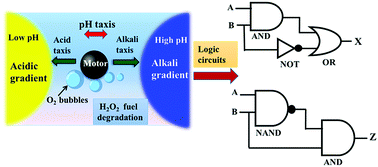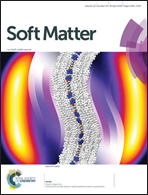Boolean-chemotaxis of logibots deciphering the motions of self-propelling microorganisms†
Abstract
We demonstrate the feasibility of a self-propelling mushroom motor, namely a ‘logibot’, as a functional unit for the construction of a host of optimized binary logic gates. Emulating the chemokinesis of unicellular prokaryotes or eukaryotes, the logibots made stimuli responsive conditional movements at varied speeds towards a pair of acid–alkali triggers. A series of integrative logic operations and cascaded logic circuits, namely, AND, NAND, NOT, OR, NOR, and NIMPLY, have been constructed employing the decisive chemotactic migrations of the logibot in the presence of the pH gradient established by the sole or coupled effects of acid (HCl-catalase) and alkali (NaOH) drips inside a peroxide bath. The imposed acid and/or alkali triggers across the logibots were realized as inputs while the logic gates were functionally reconfigured to several operational modes by varying the pH of the acid–alkali inputs. The self-propelling logibot could rapidly sense the external stimuli, decide, and act on the basis of intensities of the pH triggers. The impulsive responses of the logibots towards and away from the external acid–alkali stimuli were interpreted as the potential outputs of the logic gates. The external stimuli responsive self-propulsion of the logibots following different logic gates and circuits can not only be an eco-friendly alternative to the silicon-based computing operations but also be a promising strategy for the development of intelligent pH-responsive drug delivery devices.



 Please wait while we load your content...
Please wait while we load your content...